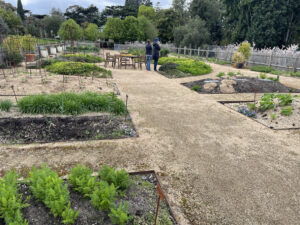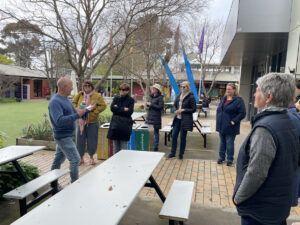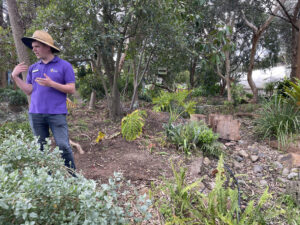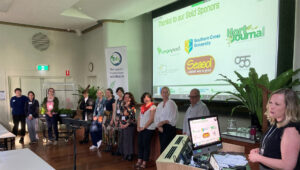Landscapes for resilience
By Doug Twentyman
It was good to finally see some legs under those faces we have only seen on Zoom over the past couple of years. After missing the 2020 conference and running the 2021 conference online, we had all been looking forward to a face-to-face conference. Therapeutic Horticulture Australia Conference 2022 gathered on Wurundjeri land in the beautiful grounds of Melbourne University’s Burnley Campus, all we needed was the weather to behave and it did so spectacularly.
The title of this conference ‘Landscapes for Resilience -– Embrace Regrow Heal’ reflected Australia emerging from the challenges of the past couple of years and how important gardens, and nature in general, contributed to the wellbeing of the population. A great practical example was the continuance or reintroduction of vegetable and community gardens, for many, the only opportunity for socialisation over long periods.
The speakers covered topics across a broad range of Therapeutic Horticulture (TH) areas and were headlined by three inspiring keynote speakers.
We had the pleasure of hearing from Dr. Anna María Pálsdóttir, a Nordic researcher who works with conceptual development and scientific evaluations of nature-based and nature-assisted interventions. She spoke of her work involving research in nature-based rehabilitation for individuals with stress related mental illness, individuals suffering from post-stroke mental fatigue and refugees in need of work-orientated rehabilitation. The last three years in particular, has seen Dr. Anna María work in this area.

Andrew Laidlaw is a qualified Landscape Architect and Horticulturist and was the second keynote speaker for the day. He is widely known for his long-standing role at the Royal Botanic Gardens, Melbourne. Andrew’s presentation described many aspects of his work in the gardens, including the planning around the Ian Potter Foundation Children’s Garden, Guilfoyle’s Volcano, the rejuvenation of Fern Gully with the unique meditation gardens and the White Oak Project. He also spoke about the development of the global Gardens of Peace Project, an organisation dedicated to building gardens for vulnerable communities around the world. To that end, he discussed his current work on a new garden for children in the Gaza Strip.
Our third keynote speaker, Dr. Jonathan Kingsley, a Senior Lecturer in Health Promotion at Swinburne University of Technology, Melbourne, has dedicated ten years to working in Aboriginal Community Controlled Health Organisations. Dr. Kingsley spoke of his work and challenged THA with ten big-picture goals or challenges.
Former THA President, Steven Wells, who has combined his nursing and horticulture careers, and works as a Rehabilitation Nurse and Gardens and Grounds Program Project Officer with Austin Health, explained how, through the pandemic, he introduced time in the gardens to health workers to help release some of the stresses they were enduring. He described the positive effects of something simple like collecting flowers and foliage from the grounds and presenting arrangements to the maintenance and cleaning staff to let them know they were not forgotten. This program is continuing today.
“Mother, Nature and Me”, is a project Dr. Kate Neale is working on in the mid north coast of NSW. The project offers mothers and their babies the opportunity to come together in an inclusive, safe and culturally sensitive greenspace with support services and specialists, to promote a wholistic, person-centred and collaborative approach to wellbeing for participants. While the evaluation is not yet complete, emerging findings demonstrate a culturally sensitive and safe environment is improving social connection, leading to improvements in participants’ willingness to seek help and participate in parenting programs.

Leigh McGaghey (THA’s Vice-President), a Landscape Architect now working with psychologists in Horticulture Therapy settings, helped to break down some of the barriers horticulturists and landscape designers have when working with Allied Health Professionals (AHP). She offered insight into some of the essential skills and knowledge required when working in the AHP world, and how to speak their language or understand their terminology.
The concurrent sessions also provided some opportunity for a range of practitioners to discuss with delegates the types of programs they are involved with. Tanya Bearup spoke of her work in providing a Therapeutic Horticulture (TH) program for children on the autism spectrum. Most Australian TH programs are person-centred and Tanya’s is no exception. She works within the NDIS framework and described the importance of collaborating with the care team around individuals.
Richard Thorpe is a psychologist whose research explores the integration of Acceptance and Commitment Therapy (ACT) and Ecotherapy. His work with ACT naturally draws on, and integrates, the beneficial health findings from nature studies.
What happens when we are separated from nature for whatever reason? The essential therapy we get by just being outdoors is felt by everyone. Kit Kline discussed the many ways we may bring nature indoors, and still practice nature-based mindfulness and engage in other meaningful activities for yourself and others we work with.
The current THA President, Tara Graham Cochrane, is an internationally award-winning Landscape Architect specialising in the design of healing and therapeutic landscapes. Tara spoke about how design can make a significant difference to independence and the quality of life of people in a range of settings and the barriers that disable a person from connecting with nature, and provided the tools to be able to help people get back outside.

Patrick Wain discussed the exciting work being implemented in a collaborative partnership between Kevin Heinze Grow, the Royal Botanic Gardens Victoria and Regis Aged Care, to improve the wellbeing of aged care residents through contact with nature at the care facility and in the botanic gardens.
The experiences shared by Dan Austin about his international work in the Solomon Islands, Africa and the Middle East including establishing horticultural programs in villages within countries with extremely limited resources, highlighted the challenges ahead for worldwide TH programs.
Building resilient gardens for marginalised people in West Africa was also the topic David Lewis elaborated on, with discussion around how inclusive practises were needed to overcome the barriers for success.
Cath Manual is well known on the Sunshine Coast for her work in TH, both in programs she runs and in education. Cath spoke of the requirements of being a provider for NDIS, and the pricing arrangements to charge for services and engaging with participants.
It’s great to experience TH work in practise and as such, the pre-conference tours were a great success. Some of the sites visited included the operations of Kevin Heinze Grow, Odyssey House, the Catholic Regional College, Sydenham to see TH operating in a school setting, as well as the Peace and Prosperity Gardens at Government House.
A great conference was enjoyed after a two-year break and we look forward to 2023.
Doug Twentyman
Secretary
Therapeutic Horticulture Australia
W: tha.org.au

